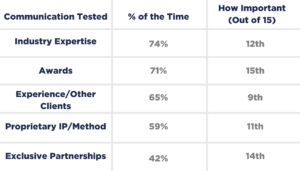It’s true.
The moment you start talking about yourself is the moment you start losing.
Personally, I am just as guilty as the next guy when it comes to this. It’s challenging not to engage in self-gratifying communication. Like most, I am passionate about what I do, and I want the person across from me to be confident I am able to deliver on our company promise.
There is no doubt that, as human beings, we have a natural affinity to talk about ourselves; self-promotion is hard-wired into our DNA as a survival mechanism. However, when it comes to our businesses, it seems all we do is talk about ourselves.
At least in most personal conversations there is some give and take. But whether it is on our website, in our client presentations or in a sales pitch, all we do is talk about our capabilities, longevity, happy clients and experience — with a little bit of the client peppered in so we don’t look too selfish.
We have had several clients ask how much they should be talking about themselves to their customers, so we started digging into our data to find some answers.
For reference, our company, PROOF, uses customer insights and data to help companies identify the most effective messages and communication to differentiate themselves and drive sales. So we have mountains of data around what kinds of messages are most effective across a litany of industries.
In the last 100 studies we have run, we tested an average of 15 communication concepts per study. In many of these, we tested communication concepts that were about the client (i.e., “We have won several industry awards,” “Our company has worked in your industry for XX years” and “We have a proprietary process that does XYZ”) and then tested how important those communications were when considering whether to hire them.
Here are the five most commonly used self-important communications used by companies, what percent of the time we tested those communications, and where they ranked (out of 15) in importance to their customers and prospects:

What this means is that there is an average of 11 different communications that are more important to your customers than something about you.
So, if you are talking about yourself, you are losing the battle to win over customers and losing big. Think about your elevator pitch, the content on your website, your collateral, etc. How much of it is about you or your company?
Here is a quick exercise:
- Write down 10 things you think will win over your customers — and you can’t talk about yourself.
- Which one of those things do you think is most important?
- How many times do you talk about that vs. yourself in your communications?

Grant Gooding is an emotional-data thought leader; speaker; and marketing and neuroscience nerd. He is founder and CEO of PROOF Positioning, a market research firm that specializes in emotional data.


